Corporate Social Responsibility and Organizational Performance: A Case Study of Shell, UK
VerifiedAdded on 2023/04/25
|8
|2030
|374
AI Summary
In this case study we will discuss about corporate social responsibility and below are the summaries point:-
Corporate social responsibility (CSR) focuses on business organizations benefiting the environment and society.
CSR brings various benefits such as client retention, increased sales, and improved financial success.
The case study of Shell Plc explores the relationship between CSR and organizational performance in the oil and gas sector.
Contribute Materials
Your contribution can guide someone’s learning journey. Share your
documents today.
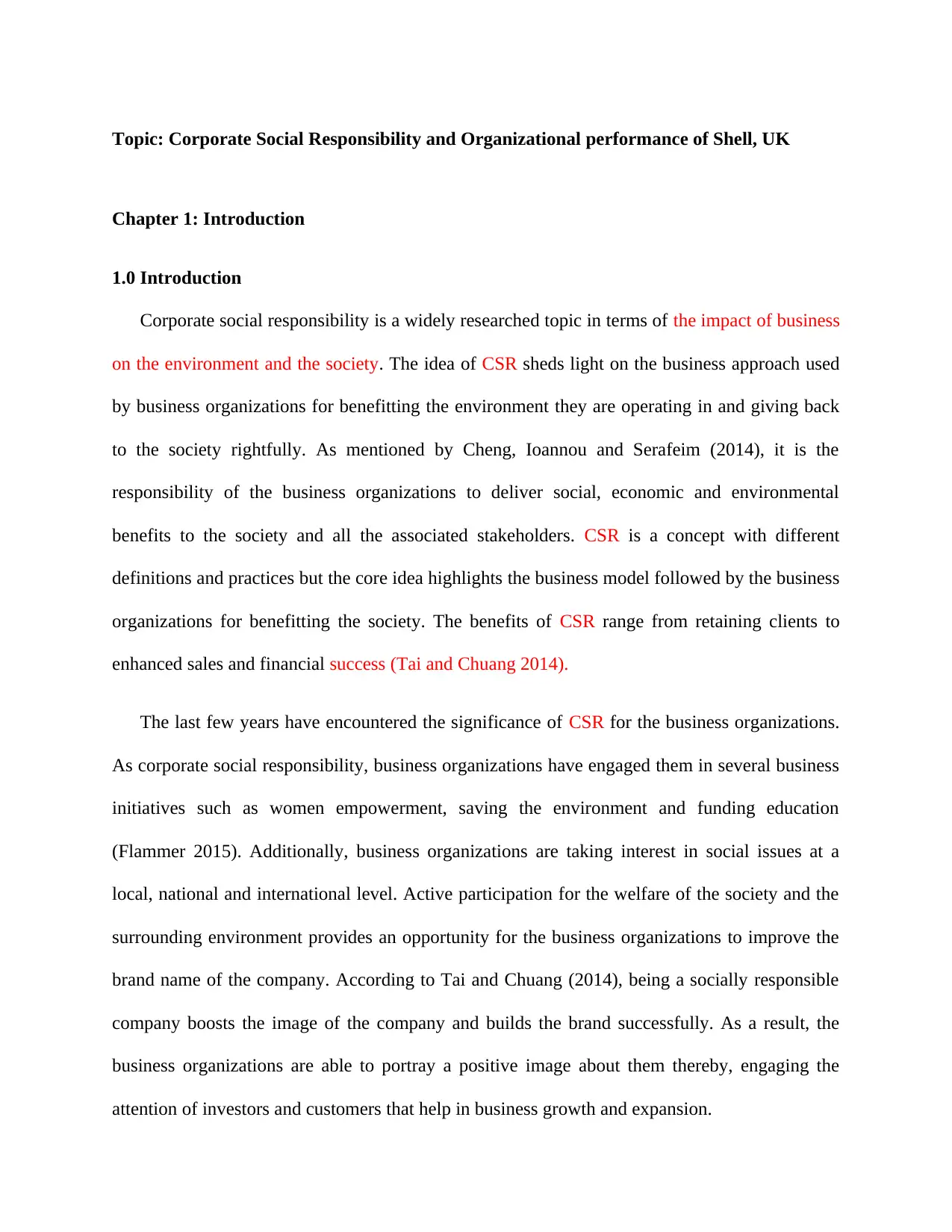
Topic: Corporate Social Responsibility and Organizational performance of Shell, UK
Chapter 1: Introduction
1.0 Introduction
Corporate social responsibility is a widely researched topic in terms of the impact of business
on the environment and the society. The idea of CSR sheds light on the business approach used
by business organizations for benefitting the environment they are operating in and giving back
to the society rightfully. As mentioned by Cheng, Ioannou and Serafeim (2014), it is the
responsibility of the business organizations to deliver social, economic and environmental
benefits to the society and all the associated stakeholders. CSR is a concept with different
definitions and practices but the core idea highlights the business model followed by the business
organizations for benefitting the society. The benefits of CSR range from retaining clients to
enhanced sales and financial success (Tai and Chuang 2014).
The last few years have encountered the significance of CSR for the business organizations.
As corporate social responsibility, business organizations have engaged them in several business
initiatives such as women empowerment, saving the environment and funding education
(Flammer 2015). Additionally, business organizations are taking interest in social issues at a
local, national and international level. Active participation for the welfare of the society and the
surrounding environment provides an opportunity for the business organizations to improve the
brand name of the company. According to Tai and Chuang (2014), being a socially responsible
company boosts the image of the company and builds the brand successfully. As a result, the
business organizations are able to portray a positive image about them thereby, engaging the
attention of investors and customers that help in business growth and expansion.
Chapter 1: Introduction
1.0 Introduction
Corporate social responsibility is a widely researched topic in terms of the impact of business
on the environment and the society. The idea of CSR sheds light on the business approach used
by business organizations for benefitting the environment they are operating in and giving back
to the society rightfully. As mentioned by Cheng, Ioannou and Serafeim (2014), it is the
responsibility of the business organizations to deliver social, economic and environmental
benefits to the society and all the associated stakeholders. CSR is a concept with different
definitions and practices but the core idea highlights the business model followed by the business
organizations for benefitting the society. The benefits of CSR range from retaining clients to
enhanced sales and financial success (Tai and Chuang 2014).
The last few years have encountered the significance of CSR for the business organizations.
As corporate social responsibility, business organizations have engaged them in several business
initiatives such as women empowerment, saving the environment and funding education
(Flammer 2015). Additionally, business organizations are taking interest in social issues at a
local, national and international level. Active participation for the welfare of the society and the
surrounding environment provides an opportunity for the business organizations to improve the
brand name of the company. According to Tai and Chuang (2014), being a socially responsible
company boosts the image of the company and builds the brand successfully. As a result, the
business organizations are able to portray a positive image about them thereby, engaging the
attention of investors and customers that help in business growth and expansion.
Secure Best Marks with AI Grader
Need help grading? Try our AI Grader for instant feedback on your assignments.
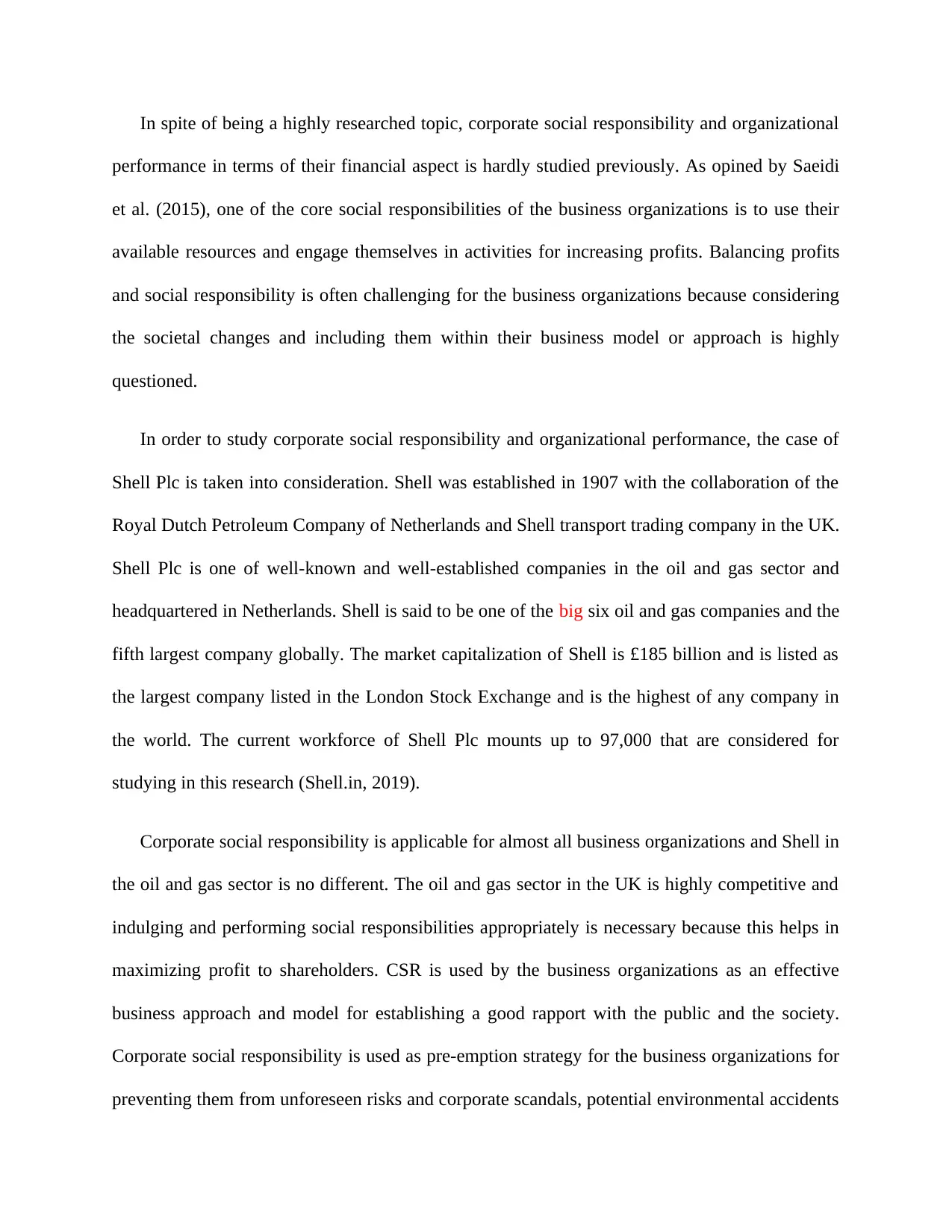
In spite of being a highly researched topic, corporate social responsibility and organizational
performance in terms of their financial aspect is hardly studied previously. As opined by Saeidi
et al. (2015), one of the core social responsibilities of the business organizations is to use their
available resources and engage themselves in activities for increasing profits. Balancing profits
and social responsibility is often challenging for the business organizations because considering
the societal changes and including them within their business model or approach is highly
questioned.
In order to study corporate social responsibility and organizational performance, the case of
Shell Plc is taken into consideration. Shell was established in 1907 with the collaboration of the
Royal Dutch Petroleum Company of Netherlands and Shell transport trading company in the UK.
Shell Plc is one of well-known and well-established companies in the oil and gas sector and
headquartered in Netherlands. Shell is said to be one of the big six oil and gas companies and the
fifth largest company globally. The market capitalization of Shell is £185 billion and is listed as
the largest company listed in the London Stock Exchange and is the highest of any company in
the world. The current workforce of Shell Plc mounts up to 97,000 that are considered for
studying in this research (Shell.in, 2019).
Corporate social responsibility is applicable for almost all business organizations and Shell in
the oil and gas sector is no different. The oil and gas sector in the UK is highly competitive and
indulging and performing social responsibilities appropriately is necessary because this helps in
maximizing profit to shareholders. CSR is used by the business organizations as an effective
business approach and model for establishing a good rapport with the public and the society.
Corporate social responsibility is used as pre-emption strategy for the business organizations for
preventing them from unforeseen risks and corporate scandals, potential environmental accidents
performance in terms of their financial aspect is hardly studied previously. As opined by Saeidi
et al. (2015), one of the core social responsibilities of the business organizations is to use their
available resources and engage themselves in activities for increasing profits. Balancing profits
and social responsibility is often challenging for the business organizations because considering
the societal changes and including them within their business model or approach is highly
questioned.
In order to study corporate social responsibility and organizational performance, the case of
Shell Plc is taken into consideration. Shell was established in 1907 with the collaboration of the
Royal Dutch Petroleum Company of Netherlands and Shell transport trading company in the UK.
Shell Plc is one of well-known and well-established companies in the oil and gas sector and
headquartered in Netherlands. Shell is said to be one of the big six oil and gas companies and the
fifth largest company globally. The market capitalization of Shell is £185 billion and is listed as
the largest company listed in the London Stock Exchange and is the highest of any company in
the world. The current workforce of Shell Plc mounts up to 97,000 that are considered for
studying in this research (Shell.in, 2019).
Corporate social responsibility is applicable for almost all business organizations and Shell in
the oil and gas sector is no different. The oil and gas sector in the UK is highly competitive and
indulging and performing social responsibilities appropriately is necessary because this helps in
maximizing profit to shareholders. CSR is used by the business organizations as an effective
business approach and model for establishing a good rapport with the public and the society.
Corporate social responsibility is used as pre-emption strategy for the business organizations for
preventing them from unforeseen risks and corporate scandals, potential environmental accidents
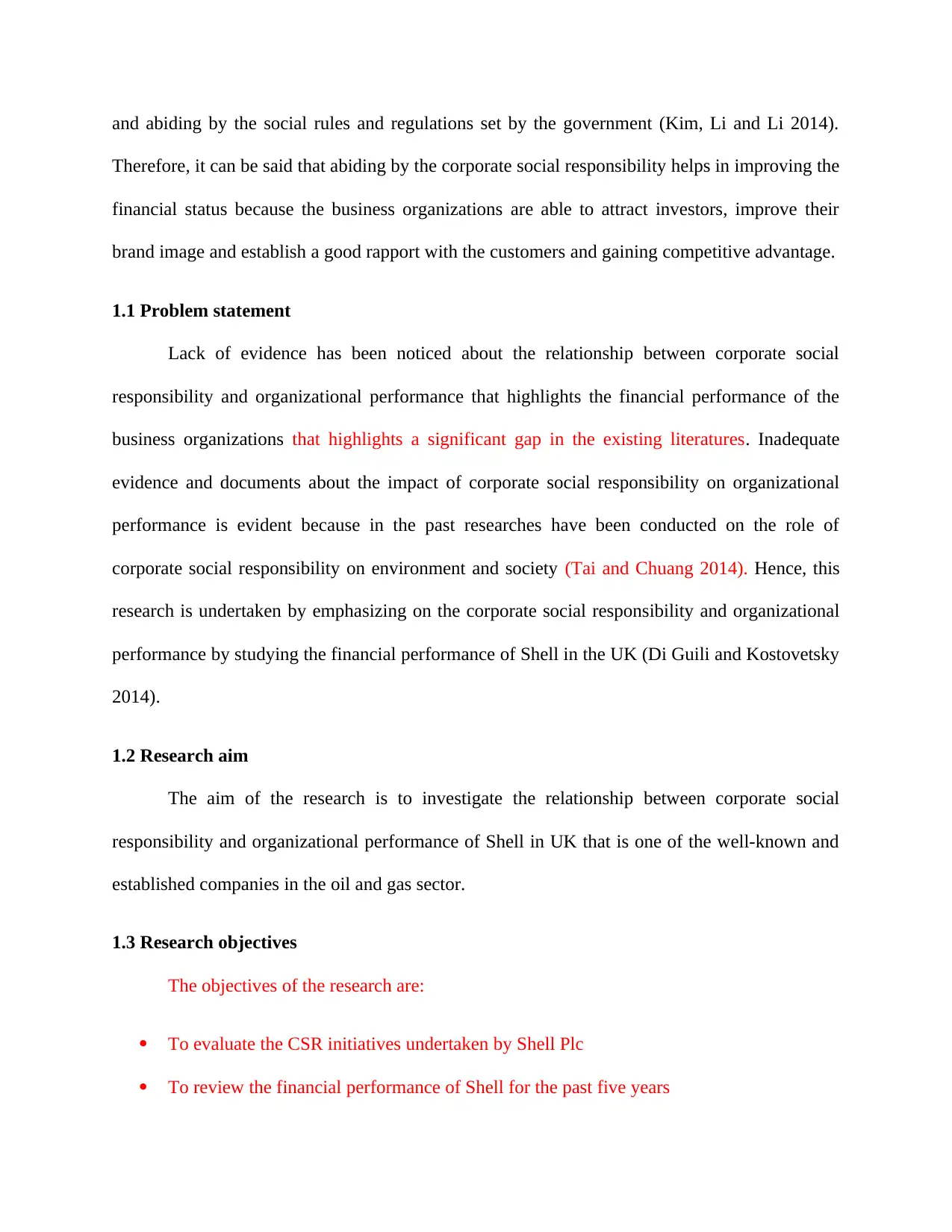
and abiding by the social rules and regulations set by the government (Kim, Li and Li 2014).
Therefore, it can be said that abiding by the corporate social responsibility helps in improving the
financial status because the business organizations are able to attract investors, improve their
brand image and establish a good rapport with the customers and gaining competitive advantage.
1.1 Problem statement
Lack of evidence has been noticed about the relationship between corporate social
responsibility and organizational performance that highlights the financial performance of the
business organizations that highlights a significant gap in the existing literatures. Inadequate
evidence and documents about the impact of corporate social responsibility on organizational
performance is evident because in the past researches have been conducted on the role of
corporate social responsibility on environment and society (Tai and Chuang 2014). Hence, this
research is undertaken by emphasizing on the corporate social responsibility and organizational
performance by studying the financial performance of Shell in the UK (Di Guili and Kostovetsky
2014).
1.2 Research aim
The aim of the research is to investigate the relationship between corporate social
responsibility and organizational performance of Shell in UK that is one of the well-known and
established companies in the oil and gas sector.
1.3 Research objectives
The objectives of the research are:
To evaluate the CSR initiatives undertaken by Shell Plc
To review the financial performance of Shell for the past five years
Therefore, it can be said that abiding by the corporate social responsibility helps in improving the
financial status because the business organizations are able to attract investors, improve their
brand image and establish a good rapport with the customers and gaining competitive advantage.
1.1 Problem statement
Lack of evidence has been noticed about the relationship between corporate social
responsibility and organizational performance that highlights the financial performance of the
business organizations that highlights a significant gap in the existing literatures. Inadequate
evidence and documents about the impact of corporate social responsibility on organizational
performance is evident because in the past researches have been conducted on the role of
corporate social responsibility on environment and society (Tai and Chuang 2014). Hence, this
research is undertaken by emphasizing on the corporate social responsibility and organizational
performance by studying the financial performance of Shell in the UK (Di Guili and Kostovetsky
2014).
1.2 Research aim
The aim of the research is to investigate the relationship between corporate social
responsibility and organizational performance of Shell in UK that is one of the well-known and
established companies in the oil and gas sector.
1.3 Research objectives
The objectives of the research are:
To evaluate the CSR initiatives undertaken by Shell Plc
To review the financial performance of Shell for the past five years
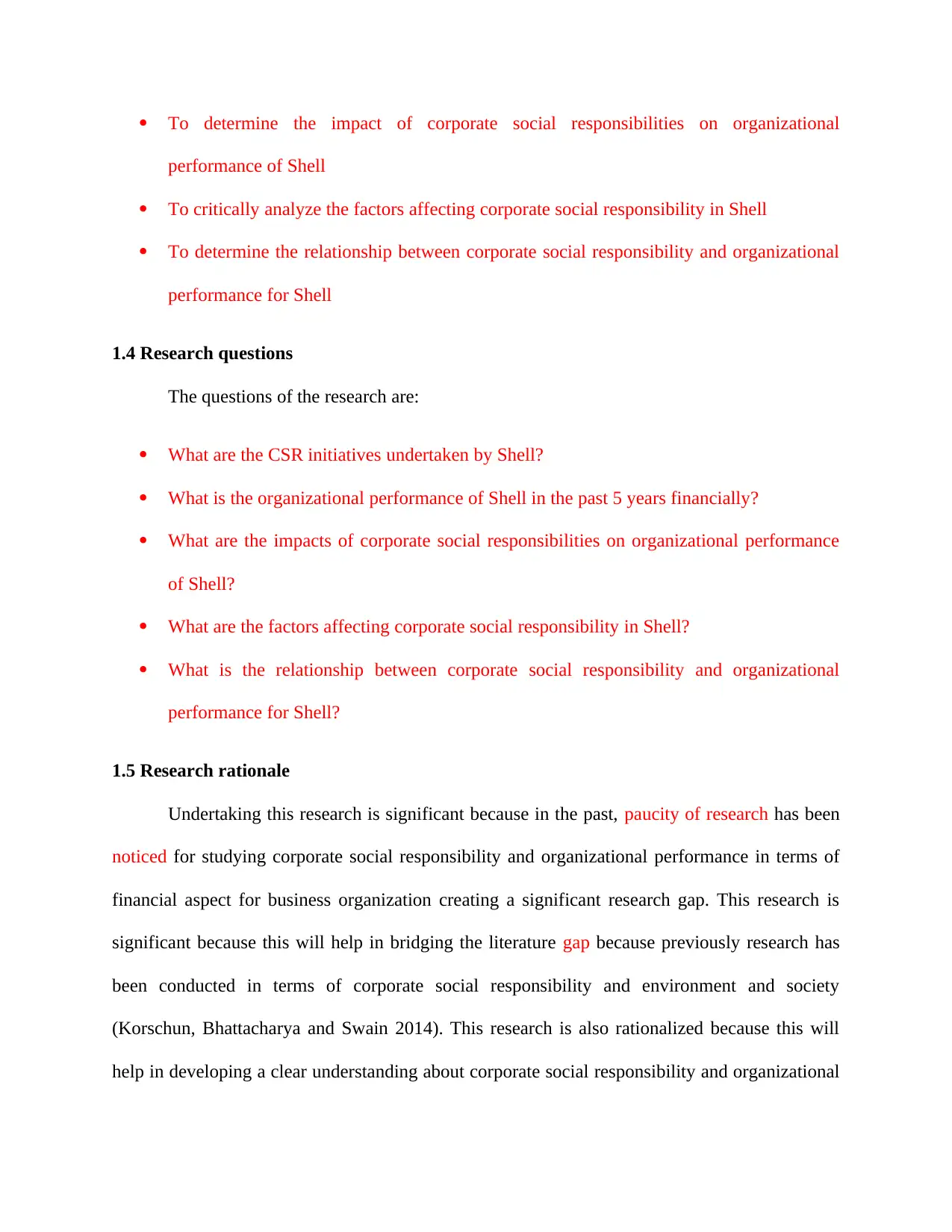
To determine the impact of corporate social responsibilities on organizational
performance of Shell
To critically analyze the factors affecting corporate social responsibility in Shell
To determine the relationship between corporate social responsibility and organizational
performance for Shell
1.4 Research questions
The questions of the research are:
What are the CSR initiatives undertaken by Shell?
What is the organizational performance of Shell in the past 5 years financially?
What are the impacts of corporate social responsibilities on organizational performance
of Shell?
What are the factors affecting corporate social responsibility in Shell?
What is the relationship between corporate social responsibility and organizational
performance for Shell?
1.5 Research rationale
Undertaking this research is significant because in the past, paucity of research has been
noticed for studying corporate social responsibility and organizational performance in terms of
financial aspect for business organization creating a significant research gap. This research is
significant because this will help in bridging the literature gap because previously research has
been conducted in terms of corporate social responsibility and environment and society
(Korschun, Bhattacharya and Swain 2014). This research is also rationalized because this will
help in developing a clear understanding about corporate social responsibility and organizational
performance of Shell
To critically analyze the factors affecting corporate social responsibility in Shell
To determine the relationship between corporate social responsibility and organizational
performance for Shell
1.4 Research questions
The questions of the research are:
What are the CSR initiatives undertaken by Shell?
What is the organizational performance of Shell in the past 5 years financially?
What are the impacts of corporate social responsibilities on organizational performance
of Shell?
What are the factors affecting corporate social responsibility in Shell?
What is the relationship between corporate social responsibility and organizational
performance for Shell?
1.5 Research rationale
Undertaking this research is significant because in the past, paucity of research has been
noticed for studying corporate social responsibility and organizational performance in terms of
financial aspect for business organization creating a significant research gap. This research is
significant because this will help in bridging the literature gap because previously research has
been conducted in terms of corporate social responsibility and environment and society
(Korschun, Bhattacharya and Swain 2014). This research is also rationalized because this will
help in developing a clear understanding about corporate social responsibility and organizational
Secure Best Marks with AI Grader
Need help grading? Try our AI Grader for instant feedback on your assignments.
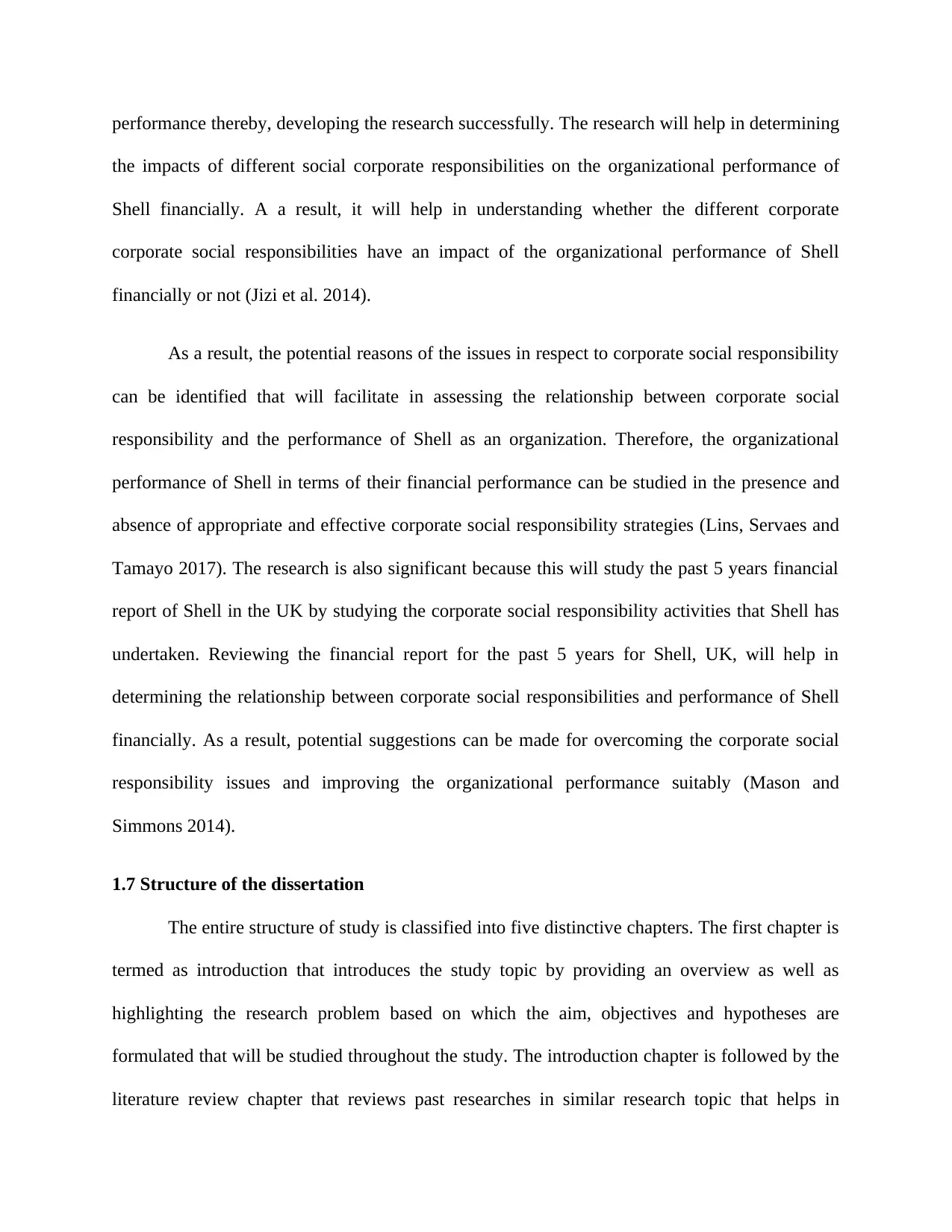
performance thereby, developing the research successfully. The research will help in determining
the impacts of different social corporate responsibilities on the organizational performance of
Shell financially. A a result, it will help in understanding whether the different corporate
corporate social responsibilities have an impact of the organizational performance of Shell
financially or not (Jizi et al. 2014).
As a result, the potential reasons of the issues in respect to corporate social responsibility
can be identified that will facilitate in assessing the relationship between corporate social
responsibility and the performance of Shell as an organization. Therefore, the organizational
performance of Shell in terms of their financial performance can be studied in the presence and
absence of appropriate and effective corporate social responsibility strategies (Lins, Servaes and
Tamayo 2017). The research is also significant because this will study the past 5 years financial
report of Shell in the UK by studying the corporate social responsibility activities that Shell has
undertaken. Reviewing the financial report for the past 5 years for Shell, UK, will help in
determining the relationship between corporate social responsibilities and performance of Shell
financially. As a result, potential suggestions can be made for overcoming the corporate social
responsibility issues and improving the organizational performance suitably (Mason and
Simmons 2014).
1.7 Structure of the dissertation
The entire structure of study is classified into five distinctive chapters. The first chapter is
termed as introduction that introduces the study topic by providing an overview as well as
highlighting the research problem based on which the aim, objectives and hypotheses are
formulated that will be studied throughout the study. The introduction chapter is followed by the
literature review chapter that reviews past researches in similar research topic that helps in
the impacts of different social corporate responsibilities on the organizational performance of
Shell financially. A a result, it will help in understanding whether the different corporate
corporate social responsibilities have an impact of the organizational performance of Shell
financially or not (Jizi et al. 2014).
As a result, the potential reasons of the issues in respect to corporate social responsibility
can be identified that will facilitate in assessing the relationship between corporate social
responsibility and the performance of Shell as an organization. Therefore, the organizational
performance of Shell in terms of their financial performance can be studied in the presence and
absence of appropriate and effective corporate social responsibility strategies (Lins, Servaes and
Tamayo 2017). The research is also significant because this will study the past 5 years financial
report of Shell in the UK by studying the corporate social responsibility activities that Shell has
undertaken. Reviewing the financial report for the past 5 years for Shell, UK, will help in
determining the relationship between corporate social responsibilities and performance of Shell
financially. As a result, potential suggestions can be made for overcoming the corporate social
responsibility issues and improving the organizational performance suitably (Mason and
Simmons 2014).
1.7 Structure of the dissertation
The entire structure of study is classified into five distinctive chapters. The first chapter is
termed as introduction that introduces the study topic by providing an overview as well as
highlighting the research problem based on which the aim, objectives and hypotheses are
formulated that will be studied throughout the study. The introduction chapter is followed by the
literature review chapter that reviews past researches in similar research topic that helps in

conducting extensive research and developing deeper understanding about the topic. This chapter
also shares information about relevant theories, models and concepts accordingly.
The chapter also identifies the independent and the dependent variables based on which
the entire chapter is structured. The research methodology chapter comes in the third chapter that
discusses all the existing methodological tools that can be used while conducting a research.
Apart from defining and discussing the characteristics of each tool, the chapter also explains the
selection of each research methodology in respect to the study topic. The data analysis chapter is
presented after the research methodology chapter in which relevant data and information are
collected according to the methods mentioned in the previous chapters and the results obtained
are discussed by referring to information provided in previous chapters of the study. The last
chapter deduces an overall conclusion by highlighting the potential gap in the study followed by
discussing its impact on the selected organization, linking the findings with objectives,
suggesting recommendations and mentioning the future scope of the study.
also shares information about relevant theories, models and concepts accordingly.
The chapter also identifies the independent and the dependent variables based on which
the entire chapter is structured. The research methodology chapter comes in the third chapter that
discusses all the existing methodological tools that can be used while conducting a research.
Apart from defining and discussing the characteristics of each tool, the chapter also explains the
selection of each research methodology in respect to the study topic. The data analysis chapter is
presented after the research methodology chapter in which relevant data and information are
collected according to the methods mentioned in the previous chapters and the results obtained
are discussed by referring to information provided in previous chapters of the study. The last
chapter deduces an overall conclusion by highlighting the potential gap in the study followed by
discussing its impact on the selected organization, linking the findings with objectives,
suggesting recommendations and mentioning the future scope of the study.
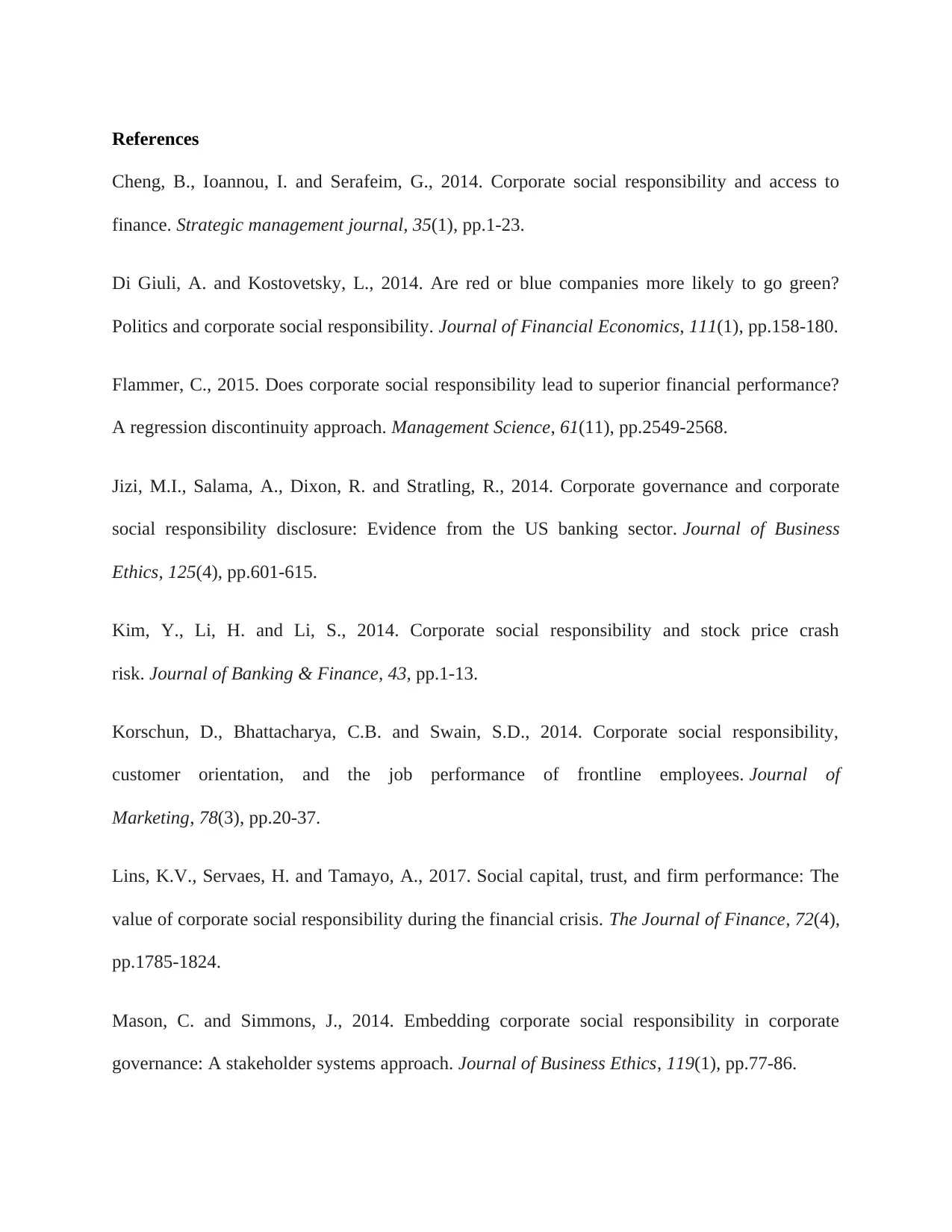
References
Cheng, B., Ioannou, I. and Serafeim, G., 2014. Corporate social responsibility and access to
finance. Strategic management journal, 35(1), pp.1-23.
Di Giuli, A. and Kostovetsky, L., 2014. Are red or blue companies more likely to go green?
Politics and corporate social responsibility. Journal of Financial Economics, 111(1), pp.158-180.
Flammer, C., 2015. Does corporate social responsibility lead to superior financial performance?
A regression discontinuity approach. Management Science, 61(11), pp.2549-2568.
Jizi, M.I., Salama, A., Dixon, R. and Stratling, R., 2014. Corporate governance and corporate
social responsibility disclosure: Evidence from the US banking sector. Journal of Business
Ethics, 125(4), pp.601-615.
Kim, Y., Li, H. and Li, S., 2014. Corporate social responsibility and stock price crash
risk. Journal of Banking & Finance, 43, pp.1-13.
Korschun, D., Bhattacharya, C.B. and Swain, S.D., 2014. Corporate social responsibility,
customer orientation, and the job performance of frontline employees. Journal of
Marketing, 78(3), pp.20-37.
Lins, K.V., Servaes, H. and Tamayo, A., 2017. Social capital, trust, and firm performance: The
value of corporate social responsibility during the financial crisis. The Journal of Finance, 72(4),
pp.1785-1824.
Mason, C. and Simmons, J., 2014. Embedding corporate social responsibility in corporate
governance: A stakeholder systems approach. Journal of Business Ethics, 119(1), pp.77-86.
Cheng, B., Ioannou, I. and Serafeim, G., 2014. Corporate social responsibility and access to
finance. Strategic management journal, 35(1), pp.1-23.
Di Giuli, A. and Kostovetsky, L., 2014. Are red or blue companies more likely to go green?
Politics and corporate social responsibility. Journal of Financial Economics, 111(1), pp.158-180.
Flammer, C., 2015. Does corporate social responsibility lead to superior financial performance?
A regression discontinuity approach. Management Science, 61(11), pp.2549-2568.
Jizi, M.I., Salama, A., Dixon, R. and Stratling, R., 2014. Corporate governance and corporate
social responsibility disclosure: Evidence from the US banking sector. Journal of Business
Ethics, 125(4), pp.601-615.
Kim, Y., Li, H. and Li, S., 2014. Corporate social responsibility and stock price crash
risk. Journal of Banking & Finance, 43, pp.1-13.
Korschun, D., Bhattacharya, C.B. and Swain, S.D., 2014. Corporate social responsibility,
customer orientation, and the job performance of frontline employees. Journal of
Marketing, 78(3), pp.20-37.
Lins, K.V., Servaes, H. and Tamayo, A., 2017. Social capital, trust, and firm performance: The
value of corporate social responsibility during the financial crisis. The Journal of Finance, 72(4),
pp.1785-1824.
Mason, C. and Simmons, J., 2014. Embedding corporate social responsibility in corporate
governance: A stakeholder systems approach. Journal of Business Ethics, 119(1), pp.77-86.
Paraphrase This Document
Need a fresh take? Get an instant paraphrase of this document with our AI Paraphraser

Saeidi, S.P., Sofian, S., Saeidi, P., Saeidi, S.P. and Saaeidi, S.A., 2015. How does corporate
social responsibility contribute to firm financial performance? The mediating role of competitive
advantage, reputation, and customer satisfaction. Journal of business research, 68(2), pp.341-
350.
Shell.in. (2019). Shell in India. [online] Available at: https://www.shell.in/?
gclid=CjwKCAiAnsnjBRB6EiwATkM1XpK7V8z5M09qNkLD3djYNDm6v6H6dtWHOdrsmc
C39I5RCn2HR_SHrBoC4wsQAvD_BwE&gclsrc=aw.ds [Accessed 24 Feb. 2019].
Tai, F.M. and Chuang, S.H., 2014. Corporate social responsibility. Ibusiness, 6(03), p.117.
social responsibility contribute to firm financial performance? The mediating role of competitive
advantage, reputation, and customer satisfaction. Journal of business research, 68(2), pp.341-
350.
Shell.in. (2019). Shell in India. [online] Available at: https://www.shell.in/?
gclid=CjwKCAiAnsnjBRB6EiwATkM1XpK7V8z5M09qNkLD3djYNDm6v6H6dtWHOdrsmc
C39I5RCn2HR_SHrBoC4wsQAvD_BwE&gclsrc=aw.ds [Accessed 24 Feb. 2019].
Tai, F.M. and Chuang, S.H., 2014. Corporate social responsibility. Ibusiness, 6(03), p.117.
1 out of 8
Related Documents
Your All-in-One AI-Powered Toolkit for Academic Success.
+13062052269
info@desklib.com
Available 24*7 on WhatsApp / Email
![[object Object]](/_next/static/media/star-bottom.7253800d.svg)
Unlock your academic potential
© 2024 | Zucol Services PVT LTD | All rights reserved.





